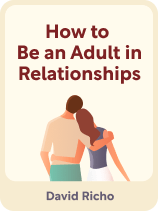

This article is an excerpt from the Shortform book guide to "How to Be an Adult in Relationships" by David Richo. Shortform has the world's best summaries and analyses of books you should be reading.
Like this article? Sign up for a free trial here.
How does mindfulness improve romantic relationships? What are the advantages of mindfulness?
David Richo’s relationship advice from How to Be an Adult in Relationships is rooted in the Buddhist concept of mindfulness, the practice of witnessing the present without evaluating, judging, or trying to influence it. When you’re mindful, you simply notice what you’re actually experiencing right now.
To learn more about how you can benefit from practicing mindfulness, keep reading.
Advantage #1: Mindfulness Encourages You to Face Reality
Richo argues that one of the advantages of mindfulness is that it enables you to accept reality by keeping you tethered to the present. Instead of allowing your mind to come up with interpretations of events that may or may not be accurate, mindfulness requires you to focus on the verifiable facts of a situation—what you’re actually experiencing.
(Shortform note: In Radical Acceptance, Buddhist psychologist Tara Brach explains that in the Buddhist tradition, facing reality is known as clear comprehension, and it’s an important step on the path to greater enlightenment. Clear comprehension is liberating because it helps you make necessary changes to your life—you can’t accept and address dysfunction without first seeing the dysfunction clearly.)
How Facing Reality Helps Your Relationship
Richo says that a fuller understanding of reality helps you act appropriately in your relationship. You won’t perceive slights or failures where there aren’t any—and you won’t under- or overreact to them when there are. It’ll be easier to take stock of any situation, weigh your options, and make informed decisions about how to move forward in a healthy way.
For example, your partner forgets your birthday once. A mindful response is acceptance of the fact that they simply forgot, rather than interpreting a sign that you’re not important to them. Alternatively, if you notice your partner repeatedly forgets your birthday, a mindful response is the conclusion that your birthday is not important to them, rather than an impulse to make excuses for their behavior.
(Shortform note: Another way that mindfulness helps you face reality in your relationships is by improving your emotional self-awareness. According to psychologists, if you mindfully face your feelings as you experience them, you’ll gradually get better at identifying and coping with them. This makes it easier for you to understand and share your feelings with your partner in a way they can understand, which helps you both maintain emotional intimacy and resolve conflict.)
Advantage #2: Mindfulness Enables You to Be Emotionally Resilient
Richo also explains that mindfulness teaches you that you’re strong enough to handle all of your feelings, perceptions, and experiences, no matter how uncomfortable they may be.
(Shortform note: Psychologists explain that mindfulness increases your emotional resilience by teaching you how to tolerate discomfort. As you pay attention to reality from moment to moment, you may have some negative feelings—maybe you’re feeling anxious because you had a bad day or you have some lingering pain from an old injury. There may be little you can do to stop those sensations right now, but at least you can wholeheartedly accept them as part of your present reality. When you let yourself fully experience uncomfortable emotions, you stop resisting those emotions, which makes accepting, processing, and moving on from them easier.)
How Emotional Resilience Helps Your Relationship
Since you’ll feel confident that you can endure pain and discomfort, you’ll feel comfortable being yourself and letting your partner be herself—even if that means you might sometimes be at odds with each other.
Emotional resilience prepares you to accept and deal with this interpersonal conflict head-on, rather than denying or avoiding it. Richo says that proactively addressing conflict helps you resolve it more easily, which strengthens your relationship.
(Shortform note: Relationship experts note that conflict avoidance can actually lead to greater conflict and less intimacy over time. When you suppress negative emotions instead of addressing them with your partner, those feelings will only get bigger and eventually build up to resentment. Eventually, you’re likely to explode, and your response will probably be harsher than necessary—this can negatively impact your connection with your partner, making intimacy harder.)
Advantage #3: Mindfulness Facilitates Compassionate Validation
Richo explains that mindfulness encourages you to assume a compassionate view of reality—when you see things as they really are, you’ll discover two things:
- Every living being is irrevocably divine, fundamentally good, and capable of both loving and being loved.
- The universe itself is compassionate since it generously provides you (and all other forms of life) with everything you need to survive—and often even more than that.
When you adopt the view that all life has inherent lovability, you’ll be able to feel compassion for others—even if you disagree with them, are upset with them, or simply can’t relate to them.
(Shortform note: Many spiritual and secular philosophies generally follow tenets similar to those of inherent lovability and a compassionate universe. For example, according to the Law of Attraction, positive energy flows from the universe into your life when you think positively. In short, these tenets reflect the basic idea that when you believe that the universe is compassionate and has good things in store for you, you mirror that compassion in your life and relationships.)
How Compassion Helps Your Relationship
Since mindfulness helps you feel more compassionate, it can lead you to behave more compassionately toward your partner—even when it’s difficult. Compassionate validation happens when you mindfully accept your loved one’s present reality, no matter what it is, and make them feel like it’s OK to have that experience. For example, if your partner loses a parent, you might compassionately validate their grief by recognizing that they’re in pain, letting them talk about their feelings, expressing empathy, and showing them kindness.
Richo says that according to psychological research, compassionate validation is the most important ingredient in a healthy relationship because it makes you feel secure, connected, and loved enough to be emotionally vulnerable.
The Six Levels of Compassionate Validation
Psychologists agree that compassionate validation supports healthy relationships, and it seems to be most effective when you tailor it to suit your partner’s specific situation. According to psychologist Marsha Linehan, there are six types of validation you can use to support your partner.
- Level 1 is presence—when you’re there for someone when they need you. For example, you might be present for a friend by listening while they process a breakup.
- Level 2 is accurate reflection—when you repeat back what you’ve heard. For example, you might say, “I hear that you’re feeling frustrated with me” during a conflict.
- Level 3 is guessing—when you notice your loved one’s behavior and guess what they’re feeling. For example, if someone is pacing, you might ask if they’re feeling anxious.
- Level 4 is understanding—when your loved one’s behavior makes sense to you because you know them well. For example, if your partner has a difficult relationship with their parents, you might understand why they’re hesitant to introduce you to them.
- Level 5 is normalizing—recognizing that anyone would feel the same way in similar circumstances. For example, you might normalize your child’s grief after their first pet dies by telling them everyone feels sad when they lose someone they love.
- Level 6 is “radical genuineness”—when you deeply empathize with your loved one as equals because you can authentically relate. For example, this might occur when you relate to someone because you share significant experiences like trauma or grief.

———End of Preview———
Like what you just read? Read the rest of the world's best book summary and analysis of David Richo's "How to Be an Adult in Relationships" at Shortform.
Here's what you'll find in our full How to Be an Adult in Relationships summary:
- The secret to a long-lasting, loving relationship
- How to overcome emotional wounds that hold you back from loving
- How the Buddhist concept of mindful loving can create a better world






